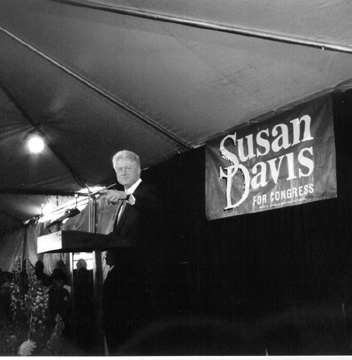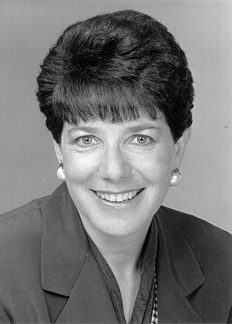By
Donald H. Harrison
San Diego (special) -- While President Bill
Clinton was urging San Diego Democrats to focus on the economy, the
congressional candidate for whom he was barnstorming was doing just that
-- some 500 miles away in Sacramento.
Because the Legislature was considering the bill by which it adopted
a state budget in excess of $100 billion, Assemblywoman Susan Davis,
San Diego, had to miss her own big fundraiser with the President that had
been scheduled from 5 p.m. to 7 p.m. on Thursday, June 22.
Dr. Stephen Davis, the husband of the 49th Congressional District candidate,
told about 1,100 supporters who had gathered in a tent on the grounds of
the refurbished El Cortez Hotel that "except for the birth of our two sons,
this would be the most important day of her life and she sends her deepest,
deepest regrets and apologies that she cannot be here."
 |
After reviewing a videotape of the event, Susan
Davis took issue with her husband, the psychiatrist. The event was the
"fourth" most important, not the third, she told this reporter. Her husband,
unaccustomed to being on stage with politicians, obviously had misspoken.
He should also have included their wedding in the top three, she said.
But no doubt it was an important event: the kind every politician lower
down on a ticket dreams about-- appearing before a cheering crowd with
the President of the United States, and maybe having a photograph taken
of them holding up their arms in a joint victory salute. |
A POINT FOR SUSAN--President Bill Clinton
spoke at a
campaign rally in a tent on the grounds of the El
Cortez Hotel
for congressional candidate Susan Davis on Thursday,
June 22. |
But, ah well, as picturesque a moment that might have been, the mundane
business of passing the state's spending blueprint for the next Fiscal
Year was more important, as everyone from President Clinton right on down
made a point of assuring the crowd.
"I am sorry Susan couldn't be here today, but I am glad she is doing
her job," Clinton said, adding to partisan cheers: "That's what Democrats
do!"
Right up to the last moment, Davis had hoped that the timing would be
such that she would be able to go to the reception and still be able to
cast her vote for the budget.
If the vote could have been taken early enough Thursday afternoon, she
might have caught a 3:50 p.m. flight down to San Diego and been at the
reception in plenty of time. Or, if an evening vote had been scheduled,
she might have flown down to the event, appeared, and flown right back
to Sacramento. But as it worked out, she had to make a choice -- and knowing
that might be the case, her staff got word to the President aboard Air
Force One that would remain at her job.
Rep. Bob Filner, D-San Diego, was aboard the presidential plane when
the message came from Davis's office. He said he immediately began adding
comments to the outline of a speech that he already had prepared for the
event. "Because she wasn't going to be there, I needed to say more about
her," Filner related. "I gave the President's staff a heart attack; I said
'now I am going to talk for 50 minutes, the old professor.'"
Before his career as a school board member, San Diego City Councilman
and member of Congress, Filner had been a history professor at San Diego
State University as well as a director of the Lipinsky Institute for Judaic
Studies. Like Filner a member of the Jewish community, Davis if elected
over Republican incumbent Brian Bilbray would double the number of Democrats
in San Diego's congressional delegation to two. Davis had followed Filner
onto the school board, but diverged from his career track by serving next
in the state Legislature rather than on the City Council.
 |
Besides the fiscal importance of the state budget,
there was an obvious political reason why Davis should remain at work rather
than fly home for a party with the President. Had she done otherwise, it
would have presented Bilbray's campaign with an obvious issue to attack
Davis at candidate forums.
As it was, it was a win-win situation for Davis. She could be portrayed
as staying at work, no matter what the temptations, even as President Clinton
drew for her campaign what Filner described as a record crowd for a local
congressional event. The reception with the President netted for her campaign
coffers about $125,000.
Davis said some expenditures in the California State Budget were particularly
close to her heart. One was an appropriation to continue work on State
Route 52, an |
| SUSAN DAVIS |
east-west freeway which remains unfinished between commuter-clogged Interstate
Highways 5 and 15. Another was a $198 million program to provide a sliding
scale of tax credits for families requiring child care.
Davis explained that she had helped formulate legislation which would
give up to $1,500 for child care programs to poor families, and a credit
of approximately $400 for families earning between $38,000 and $39,000-
approximately the point at which families pay state income tax.
The program, she said, will help families "who have the high cost of
child care and are trying to make ends meet. This is very helpful to them:
it's a refundable permanent credit, so that people who really aren't paying
(state income) taxes because their income isn't high enough, they still
get a refund when they have child care expenses."
There had been some discussion of video-conferencing Davis with her
supporters and the President, but Clinton's staff nixed the idea. "I think
they felt that the President would cover it, and he did," Davis said later.
"I was so honored that he was here: I really appreciated the fact that
he was coming into town and doing this for us, and we understood they felt
they needed to keep control over the meeting."
Filner warmed up the crowd for the President, giving a speech that may
have been one of the best in his career, judging by the reaction of the
crowd and the President.
He was interrupted by cheers at least 17 times, and also led the crowd
in chanting "It's time for them to go!" about congressional Republicans.
"I watched this Republican-controlled Congress vote against housing, vote
against the environment (boos!), vote against veterans (bigger boos, as
more joined in), and you now what I thought? It's time for them to go.
(Cheers.) They bottled up the Patients Bill of Rights! They bottled up
campaign finance reform! They won't let seniors have a prescription drug
benefit added to Medicare! It's time for them to go!" he added, now pounding
the lecturn for emphasis.
"They tried to keep President Clinton's 100,000 cops out of our neighborhoods,
and they tried to keep 100,000 teachers out of our classrooms. It is time
for them to go!" he said, with the crowd now joining in. "They won't build
new schools. They won't honor our nation's veterans. They won't expand
our health insurance. Just in the last couple of days, they voted to slash
housing opportunity, prevent the government from going after big tobacco,
and voted against the most minimal gun safety provisions. So what time
do you think it is?"
The crowd answered lustily, "It is time for them to go!" "That's right,"
smiled Filner. "And I will tell you, all across this country we have candidates
to wish them a pleasant trip!"
From the Davis reception, Clinton, Filner and party went to a large
Democratic party fundraising reception at Mr. A's Restaurant atop the Fifth
Street Financial Center. The next morning they appeared together at the
Arco Olympic Training Center in Chula Vista to encourage athletes now in
training for the Year 2000 Olympic Games in Australia.
"I have spoken on the same platform with him on, I don't know, a half
dozen occasions, but this was the first time he said to me, 'That was a
real good speech, Bob," Filner related. "If I get words of praise from
the master, that is amazing."
Told that some people in the audience like Lucy Goldman who had followed
his career also had remarked on his ease of delivery, and how he had roused
the crowd, Filner replied: "When you watch people, when you are in the
arena with the best people in America, you learn from them. You watch how
people do this stuff and you are called upon to do it so often. When I
am in San Diego, I may give 10-12 speeches a day, some of them 2 minutes,
some of them 12 minutes. Just by doing it, you get better I guess. I watch
other people grow (as public speakers); I guess I forget I can grow."
Although Davis did not get to her home in San Diego until 10:30 that
night, she did get to see President Clinton on Friday, June 23 -- while
standing at the rope line with other spectators.
She had been provided a front row seat to hear Clinton's speech at the
training center. Later when Clinton started shaking hands with members
of the audience, she queued up to the line with everyone else.
Filner, accompanying the President, already had pointed her out, and
Clinton made a point of going over to Davis, and telling her that the previous
night's event had gone well and that she had done the right thing by staying
in Sacramento.
Lisa Sherman, manager of Davis's congressional campaign, said that the
contributions generated by Clinton's appearance will help assure that she
has sufficient money to pay for television commercials and other forms
of advertising in the campaign against Bilbray, who won the seat in 1994
by defeating Rep. Lynn Schenk, D-San Diego.
A general election campaign with both sides spending more than $1 million
is in prospect for the 49th Congressional seat, which Democrats have targeted.
In order to win control of the House of Representatives, Democrats need
to win six seats now occupied by Republicans without losing any they now
hold.
Both Bilbray and Davis were unopposed in their respective primaries
earlier this year. Bilbray obtained a slight majority of all votes cast.
Although Bilbray outpolled Davis, Sherman said the results nevertheless
were encouraging for the Democratic challenger. In the 1998 election, in
which Bilbray was opposed unsuccessfully by San Diego City Councilwoman
Christine Kehoe, the Democratic candidate wound up with 47 percent of the
vote after making up most of a 12 percent primary election gap. In this
election, Davis starts out against Bilbray with 46 percent of the vote,
and her advertising campaign has not yet begun, Sherman said. |



